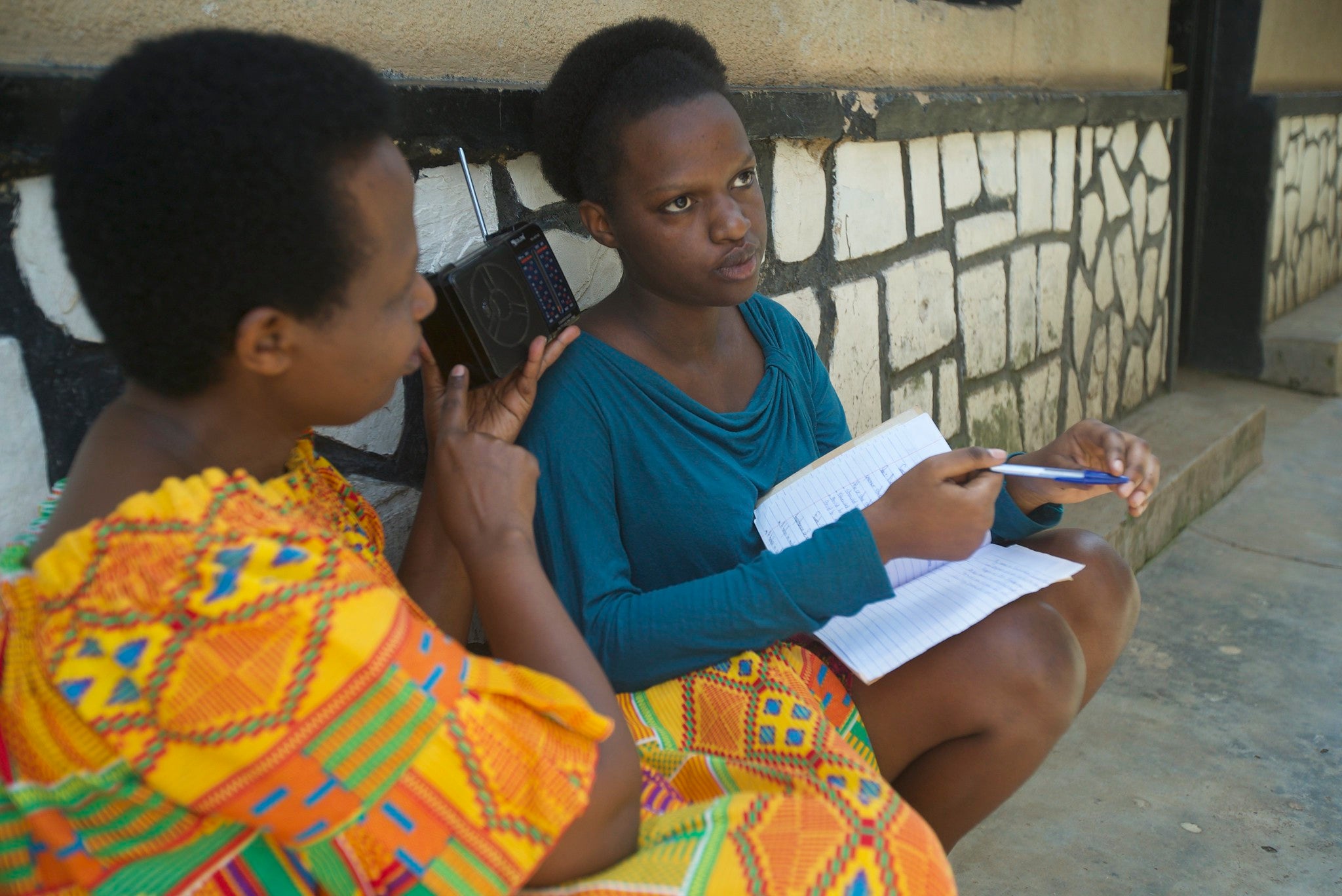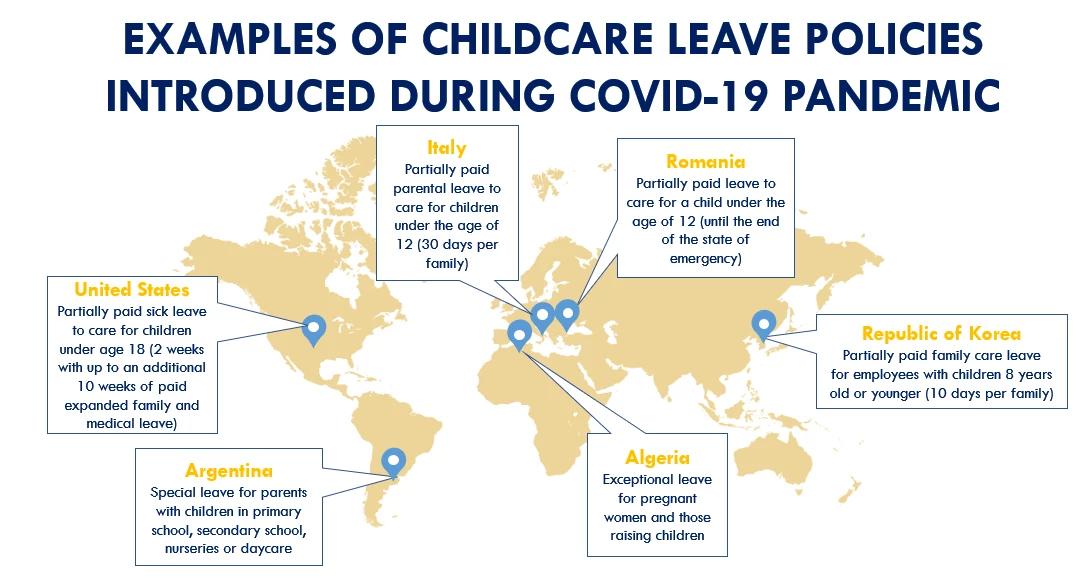 Kayirangwa Mary Assoumpta sits with her daughter, Samantha, as they listen together to radio lessons at home.© UNICEF Rwanda/2020/Saleh
Kayirangwa Mary Assoumpta sits with her daughter, Samantha, as they listen together to radio lessons at home.© UNICEF Rwanda/2020/Saleh
Schools and childcare centers are vital not only for children’s education, health, and social development, but are also critical for the economy to function. Without them, parents would not be able to participate fully in the labor force. Since the beginning of the COVID-19 pandemic, most countries temporarily or indefinitely closed schools. Thousands of childcare centers around the globe also closed their doors, in some cases permanently. At the height of lockdowns in April 2020, 91 percent of students worldwide were shut out of their classrooms, down to 61 percent today. This childcare crisis threatens to exacerbate gender inequalities in the labor market. Caregiving responsibilities disproportionately fall on women, who were already spending 4.5 hours a day on unpaid work before the pandemic while men spent less than half of that time. The unpaid labor gap between mothers and fathers has likely only been widened by the spread of the virus. Unless fathers participate equally in childcare, and employers and governments tackle the childcare crisis head-on, women’s careers are likely to suffer.
What are policymakers doing?
The World Bank Group’s Women, Business and the Law project is exploring how policymakers are addressing the childcare crisis during the pandemic. In our preliminary findings we have identified three types of support. First, introducing childcare leave for working parents is one of the most popular measures among the few countries that have acted to address the childcare crisis. This policy, generally reserved for formal sector workers, can provide job security for parents who must care for their children in the absence of regular childcare or school.
A second measure is to ensure childcare services remain available during lockdowns. Most childcare services still available during lockdowns are intended for exclusive use by essential workers, as is the case in Canada and Singapore. Australia made childcare free for all parents for three months, keeping childcare centers open during the lockdown. However, the end of this temporary measure presented new challenges for working parents.
Third, enhancing or introducing financial subsidies specifically for childcare due to COVID-19 school and daycare restrictions are also somewhat prevalent. In Malta, for example, parents can receive weekly financial assistance from the government for childcare. In Poland, parents are given an additional 14 days of childcare allowance while school and daycare facilities are closed due to the virus. In Italy, parents may receive babysitting vouchers. Some governments are also supporting the childcare industry itself. The United Kingdom, for instance, has announced that many childcare centers will not have to pay any business rates, a type of property tax, from 2020 to 2021.
How can employers support employees with childcare responsibilities?
As COVID-19 continues to widen gender gaps and exacerbate the global care crisis, employers can play an important role to ensure the wellbeing of their employees and their families.
Investing in the wellbeing and productivity of working parents now can contribute to building and retaining a more resilient and skilled workforce, ensure business sustainability, and enable lasting recovery post-COVID-19.
The International Finance Corporation published Childcare in the COVID-19 Era: A Guide for Employers in the wake of the pandemic to help employers take action during these difficult and uncertain times.
The guide outlines several ways in which employers can support parents, including understanding and complying with government directives and guidance on childcare, parental and family leave, such as the ones described above. Employers may also consult their employees and assess whether their existing workplace policies are helping them and their families. In case there are gaps in support, employers may consider adapting existing policies or creating new ones, if needed.
Employers can also directly support their employees and the communities in which they operate in many ways:
- Provide childcare services to essential workers, such as those in healthcare, when allowed and feasible. For example, IFC client Artistic Milliners, a garment-manufacturing firm based in Pakistan, recently announced that it will allow children of essential services staff, including healthcare professionals and law enforcement officials, to use its childcare facility in Karachi free of charge—after agreeing to follow strict health and safety protocols. Initially, 20 children will be accommodated at the childcare center.
- Enable home-based work (HBW) in the sectors and job roles where this is possible
- Offer flexible work options, even during HBW. These may include flexible hours/shifts, reduced hours, staggered start and finish times, telecommuting, and remote work from a different location, among others
- Allow staff to take additional family leave, preferably paid, in light of school and daycare closures and family illness
- Offer mental health support to employees as well as parent support workshops during the crisis. Keep employees up to date with the latest information on the pandemic to minimize the spread of misinformation and provide guidance on accessing health information and benefits.
- Provide easy-to-use resources to help employees keep their children learning and engaged while out of school/childcare; many free resources exist online and can be converted to hard copy materials in instances where access to technology may be an issue.
- Demonstrate kindness, compassion, and flexibility while engaging with all employees, including working parents who are in many instances juggling extra childcare responsibilities along with home-based work and may require more time and effort to complete tasks.
Working together
The impact that this pandemic could have on the prospects of working women, now and in the future, cannot be minimized. Given the sizeable contributions women’s labor force participation makes to many economies, policy responses that do not support caregiving during this time are unlikely to restore economies to their former capacities any time soon. A concerted response by both government and the private sector to COVID-19 that serves to ease childcare obligations will ensure that the pandemic does not drive masses of women out of the workforce. It will also ensure that progress made towards gender parity in economic inclusion doesn’t become another victim of this virus.





Join the Conversation